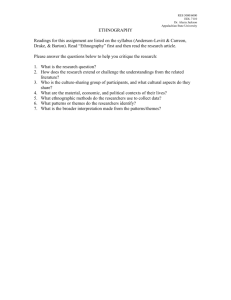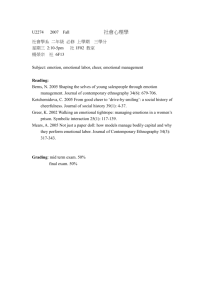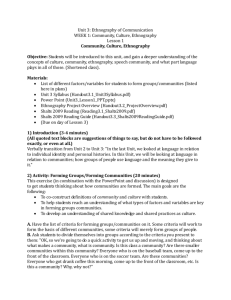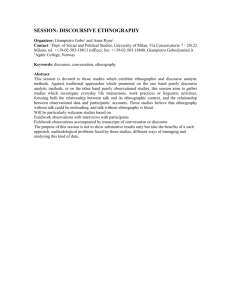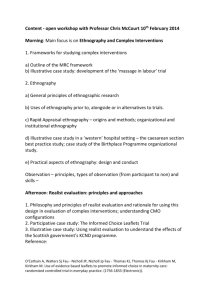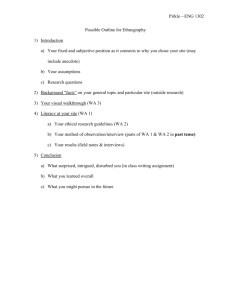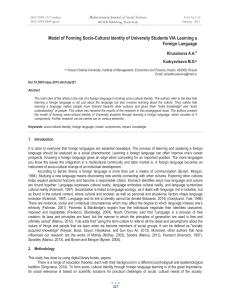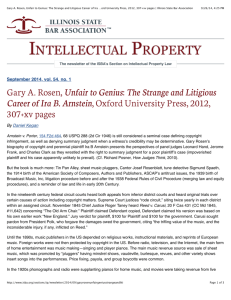Water management is not a choice, it is about our womanhood
advertisement
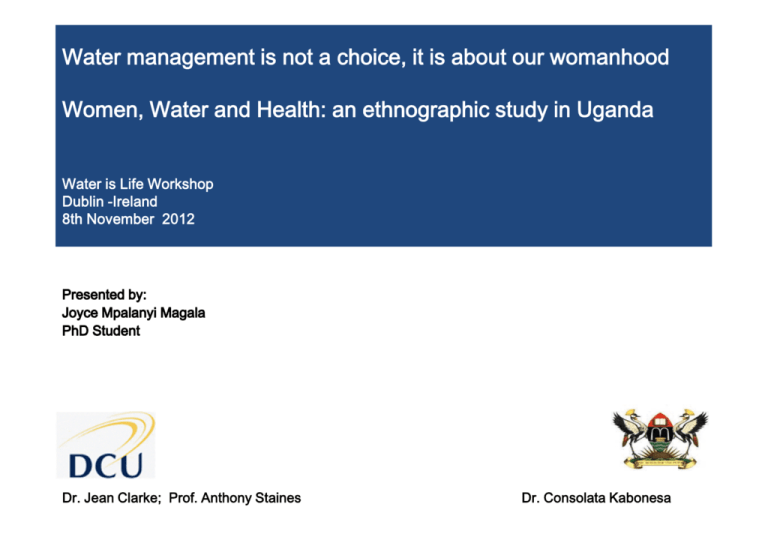
Water management is not a choice, it is about our womanhood Women, Water and Health: an ethnographic study in Uganda Water is Life Workshop Dublin -Ireland 8th November 2012 Dr. Jean Clarke; Prof. Anthony Staines Dr. Consolata Kabonesa Acknowledgements Overview Definitions • Water management • Household • Women Background • Understanding health • Disease model • Socio-cultural model Methodology Some key findings • Women’s understanding of their role and life around water health • Socio-cultural factors Implications Purpose Objectives 1. Characterise the daily experiences of women around water 2. Explore the role of women in water management at household and community level 3. Gain an understanding of the influence of water on the health and wellbeing of women Study context One village, different water technologies, semi-urban, and rural-rural settings Definitions Water management • Collection, use, handling, storage • Maintenance of communal water sources Household • Unit of immediate relatives in a rural setting Women • Limited exposure to education and life beyond where they live Introduction Women’s social and cultural responsibility for domestic water supply and management Significant effect on the health of women (Singh 2005; WHO 2009) Emphasis on reduction of water related diseases e.g. diarrhoea (WHO 2009) • Access to safe water • Health promotion Health promotion mostly targets women towards hygiene behavioural change and improved sanitation Little knowledge exists on the socio-cultural constructs (Smith 1983; Seedhouse 1997; Gunn 2001) around women, water and health Methodology Research approach • Ethnography • Symbolic interactionism (Blumer 1986) Methods • Fieldwork/participant observation (14 months) • Informal and formal interviews • Field notes and reflective diary Data analysis • • • • Agar’s “breakdown, coherence and resolution” (1986) Katz’s framework from the “how” to the “why” (2001 and 2002) Generation of themes and sub themes Description and interpretation Key Findings Private management (household) • social role • decision making • negotiating • water as a symbol of womanhood Every drop counts” “Mukazzi munnange nkugambe ki ndekeki?” You are a woman, what shall I say and not say… “Mukazzi wattu ntandikirewa kubyamazzi!” My sister where should I start to talk about water… “Amazzi gatufuula bulogoyi” We work like donkeys… “Men are inferior these days” Findings continued Public management (community) • women are responsible but with limited power • male present as authoritative and dominant, but do little “If only men could give us a helping hand with water issues” “If women talk well to their husbands, they would assist them with water issues” “Child bearing as a social security” Power relations • limited male participation • patriarchy, masculinity tendencies Findings - continued Limited availability of water • constrains ability for role performance Responsibility for water management • hinders the realisation of a woman’s full potential • limits self-actualisation Disease model of health • fails to account for the socio-cultural issues Emerging conceptual framework Water management social role Responsibility Dilemma Prescribed role Individual action Collection Use Handling Storage Influences role performance Adaptation and coping Constrained health behaviours Limited self-actualisation Water is Life Workshop 08 11 2012 Tension Challenge Struggle Juggling W o m e n Men Societal expectation Joint/group action Water committees Meetings Social gatherings THEORETICAL PERSPECTIVES o Gate keeping (Lewin 1943) o Tokenism (Arnstein 1969) o Ecofeminism (Archer 2012) o Gender (Kabeer 1999) o Power relations (Goetz 1996) PhD research and WIL project Gender-sensitive approaches • men and women engaged in raising topics of concern that determined the focus of this study Field-based placement in the local community • foregrounding of social reality from the everyday life of the women Enhanced capacity • as an academic (research skills) • development worker (linking research to practice) • stakeholder (enhanced capacity during the process of working with others on a collaborative project) • policy maker (based on evidence) Implications and knowledge on sustainable water management in Uganda Reciprocity • Women got space to engage and talk about their world of water and health • Consciousness raising , increased awareness and understanding of the water management issues • Opportunity for shared understanding and moments as women (insider and outsider) Long term impact to be felt if evidence is transferred into policy Implications and knowledge on sustainable water management in Uganda Study findings suggest: o The need to view water management and health from the women’s perspective o Shift from conventional health promotion and its emphasis on disease to a foregrounding of the socio-cultural issues References Arnstein, S. 1969. A ladder of citizen participation, Journal of the American Institute of Planners, 35 (2), pp.216-224. https://www.planning.org/pas/memo/2007/mar/pdf/JAPA35No4.pdf Agar, M. H. 1986. Speaking of ethnography. Sage University Paper series on Qualitative Research Methods, (Vol.2). Newbury Park, CA: Sage. Blumer, H. 1986. Symbolic interactionism: Perspective and method. Berkeley and Los Angeles CA, University of California Press. Goetz, A.M and Gupta, R.S. 1996. Who takes the credit? Gender, power, and control over loan use in rural credit programs in Bangladesh. World Development, 24, 1, 45-63. Hammersley, M. and Atkinson, P. 2007. Ethnography: Principles in practice. 3rd ed. New York: Taylor & Francis. Katz, J. 2001. From how to why: On luminous description and casual inferences in ethnography (Part 1). Ethnography, (2), pp. 443473. Katz, J. 2002. From how to why: On luminous description and casual inferences in ethnography (Part 2). Ethnography, 3(1), pp. 63-90 Lewin, K. (1943). Forces behind food habits and methods of change. Bulletin of the National Research Council, 108, 35-65. Kabeer, N. 1999. Resources, Agency, Achievements: Reflections on the Measurement of Women's Empowerment. Development and change, 30, 3, 435-464,. Seedhouse, D. 1997. Health promotion, philosophy, prejudice and practice. England: John Wiley & Sons Ltd. Singh, N., Jacks, G., Bhattacharya, P. 2005. Women and community water supply programmes: An analysis from a socio-cultural perspective, Natural Resources Forum 29(3), 213-223. Smith, J. 1983. The idea of health; Implications for the nursing professional. New York, Teachers College Press. WHO. 2009. Women and health, Todays evidence tomorrows agenda. Geneva: WHO. Water is Life Workshop 08 11 2012 THANK YOU Questions

